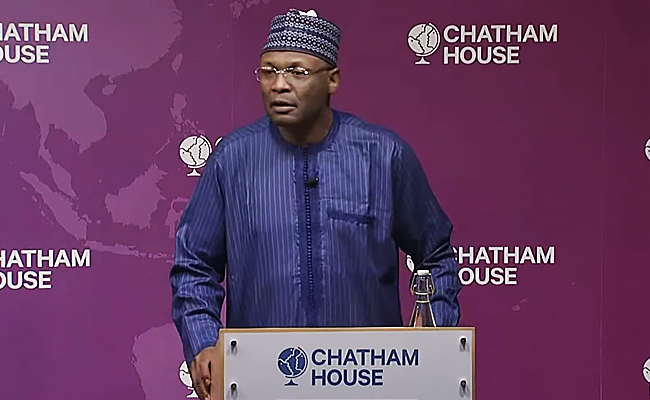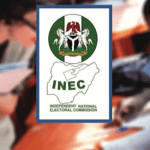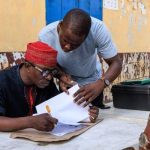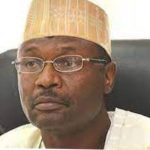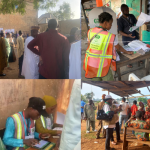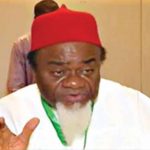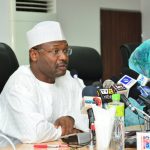The Independent National Electoral Commission has disclosed that the commission will conduct a mock election ahead of the February 25 Presidential and National Assembly elections.
The INEC Chairman, Mahmood Yakubu, made the disclosure on Tuesday while speaking at the Chatham House, London on the topic titled NIGERIA’S 2023 ELECTIONS: PREPARATIONS AND PRIORITIES FOR ELECTORAL INTEGRITY AND INCLUSION.
He said the mock accreditation would be carried out across selected polling units to ascertain the integrity of the Bimodal Voter Accreditation System, before the main elections begin in February.
Professor Yakubu said each election in Nigeria invariably presents its own unique context and therefore distinct challenges and prospects. He, however, agreed there are enormous expectations, both within Nigeria and internationally, about the conduct and management of elections in the country.
He alluded to the fact that the 2023 general election places a great responsibility on the Independent National Electoral Commission (INEC), a responsibility that the commission does not take lightly.
Speaking about election planning in Nigeria, Professor Yakubu said the commission has worked with all concerned government agencies and stakeholders to ensure that the challenges of preparing for the 2019 general election are minimised in the 2023 preparation.
Professor Yakubu further stated that Voter Registration and Permanent Voters Cards (PVC) has been a major component of the preparations for the 2023 general election. According to him, the law in Nigeria requires the Commission to conduct voter registration on a “continuous” basis. However, the law also provides dates for suspension of the process to prepare for general elections. Consequently, the Continuous Voter Registration (CVR), recommenced on 21st June 2021, following its suspension for the 2019 general election. The CVR continued until 31st July 2022 when we again suspended it for the 2023 general election. Giving a breakdown of the exercise, the INEC boss said in the one-year period of the CVR, 12,298,944 new voters were registered out of which 9,518,188 were validated after a thorough clean-up of the data.
Professor Yakubu said the clean-up of the register was painstakingly conducted by the Commission because the Automated Biometric Identification System (ABIS) that was used to check the data, detected many multiple registrants. According to him, it seemed that many voters, probably out of ignorance, re-registered when they were already in the register from previous CVR. For two weeks from 12 – 25 November 2022, the Commission displayed the entire register online and physically in the 8,809 Wards and 774 Local Government Areas for “claims and objections” as provided by law.
The Independent National Electoral Commission has disclosed that the commission will conduct a mock election ahead of the February 25 Presidential and National Assembly elections.
The INEC Chairman, Mahmood Yakubu, made the disclosure on Tuesday while speaking at the Chatham House, London on the topic titled NIGERIA’S 2023 ELECTIONS: PREPARATIONS AND PRIORITIES FOR ELECTORAL INTEGRITY AND INCLUSION.
He said the mock accreditation would be carried out across selected polling units to ascertain the integrity of the Bimodal Voter Accreditation System, before the main elections begin in February.
Professor Yakubu said each election in Nigeria invariably presents its own unique context and therefore distinct challenges and prospects. He, however, agreed there are enormous expectations, both within Nigeria and internationally, about the conduct and management of elections in the country.
He alluded to the fact that the 2023 general election places a great responsibility on the Independent National Electoral Commission (INEC), a responsibility that the commission does not take lightly.
Speaking about election planning in Nigeria, Professor Yakubu said the commission has worked with all concerned government agencies and stakeholders to ensure that the challenges of preparing for the 2019 general election are minimised in the 2023 preparation.
Professor Yakubu further stated that Voter Registration and Permanent Voters Cards (PVC) has been a major component of the preparations for the 2023 general election. According to him, the law in Nigeria requires the Commission to conduct voter registration on a “continuous” basis. However, the law also provides dates for suspension of the process to prepare for general elections. Consequently, the Continuous Voter Registration (CVR), recommenced on 21st June 2021, following its suspension for the 2019 general election. The CVR continued until 31st July 2022 when we again suspended it for the 2023 general election. Giving a breakdown of the exercise, the INEC boss said in the one-year period of the CVR, 12,298,944 new voters were registered out of which 9,518,188 were validated after a thorough clean-up of the data.
Professor Yakubu said the clean-up of the register was painstakingly conducted by the Commission because the Automated Biometric Identification System (ABIS) that was used to check the data, detected many multiple registrants. According to him, it seemed that many voters, probably out of ignorance, re-registered when they were already in the register from previous CVR. For two weeks from 12 – 25 November 2022, the Commission displayed the entire register online and physically in the 8,809 Wards and 774 Local Government Areas for “claims and objections” as provided by law.
The Independent National Electoral Commission has disclosed that the commission will conduct a mock election ahead of the February 25 Presidential and National Assembly elections.
The INEC Chairman, Mahmood Yakubu, made the disclosure on Tuesday while speaking at the Chatham House, London on the topic titled NIGERIA’S 2023 ELECTIONS: PREPARATIONS AND PRIORITIES FOR ELECTORAL INTEGRITY AND INCLUSION.
He said the mock accreditation would be carried out across selected polling units to ascertain the integrity of the Bimodal Voter Accreditation System, before the main elections begin in February.
Professor Yakubu said each election in Nigeria invariably presents its own unique context and therefore distinct challenges and prospects. He, however, agreed there are enormous expectations, both within Nigeria and internationally, about the conduct and management of elections in the country.
He alluded to the fact that the 2023 general election places a great responsibility on the Independent National Electoral Commission (INEC), a responsibility that the commission does not take lightly.
Speaking about election planning in Nigeria, Professor Yakubu said the commission has worked with all concerned government agencies and stakeholders to ensure that the challenges of preparing for the 2019 general election are minimised in the 2023 preparation.
Professor Yakubu further stated that Voter Registration and Permanent Voters Cards (PVC) has been a major component of the preparations for the 2023 general election. According to him, the law in Nigeria requires the Commission to conduct voter registration on a “continuous” basis. However, the law also provides dates for suspension of the process to prepare for general elections. Consequently, the Continuous Voter Registration (CVR), recommenced on 21st June 2021, following its suspension for the 2019 general election. The CVR continued until 31st July 2022 when we again suspended it for the 2023 general election. Giving a breakdown of the exercise, the INEC boss said in the one-year period of the CVR, 12,298,944 new voters were registered out of which 9,518,188 were validated after a thorough clean-up of the data.
Professor Yakubu said the clean-up of the register was painstakingly conducted by the Commission because the Automated Biometric Identification System (ABIS) that was used to check the data, detected many multiple registrants. According to him, it seemed that many voters, probably out of ignorance, re-registered when they were already in the register from previous CVR. For two weeks from 12 – 25 November 2022, the Commission displayed the entire register online and physically in the 8,809 Wards and 774 Local Government Areas for “claims and objections” as provided by law.
The Independent National Electoral Commission has disclosed that the commission will conduct a mock election ahead of the February 25 Presidential and National Assembly elections.
The INEC Chairman, Mahmood Yakubu, made the disclosure on Tuesday while speaking at the Chatham House, London on the topic titled NIGERIA’S 2023 ELECTIONS: PREPARATIONS AND PRIORITIES FOR ELECTORAL INTEGRITY AND INCLUSION.
He said the mock accreditation would be carried out across selected polling units to ascertain the integrity of the Bimodal Voter Accreditation System, before the main elections begin in February.
Professor Yakubu said each election in Nigeria invariably presents its own unique context and therefore distinct challenges and prospects. He, however, agreed there are enormous expectations, both within Nigeria and internationally, about the conduct and management of elections in the country.
He alluded to the fact that the 2023 general election places a great responsibility on the Independent National Electoral Commission (INEC), a responsibility that the commission does not take lightly.
Speaking about election planning in Nigeria, Professor Yakubu said the commission has worked with all concerned government agencies and stakeholders to ensure that the challenges of preparing for the 2019 general election are minimised in the 2023 preparation.
Professor Yakubu further stated that Voter Registration and Permanent Voters Cards (PVC) has been a major component of the preparations for the 2023 general election. According to him, the law in Nigeria requires the Commission to conduct voter registration on a “continuous” basis. However, the law also provides dates for suspension of the process to prepare for general elections. Consequently, the Continuous Voter Registration (CVR), recommenced on 21st June 2021, following its suspension for the 2019 general election. The CVR continued until 31st July 2022 when we again suspended it for the 2023 general election. Giving a breakdown of the exercise, the INEC boss said in the one-year period of the CVR, 12,298,944 new voters were registered out of which 9,518,188 were validated after a thorough clean-up of the data.
Professor Yakubu said the clean-up of the register was painstakingly conducted by the Commission because the Automated Biometric Identification System (ABIS) that was used to check the data, detected many multiple registrants. According to him, it seemed that many voters, probably out of ignorance, re-registered when they were already in the register from previous CVR. For two weeks from 12 – 25 November 2022, the Commission displayed the entire register online and physically in the 8,809 Wards and 774 Local Government Areas for “claims and objections” as provided by law.
The Independent National Electoral Commission has disclosed that the commission will conduct a mock election ahead of the February 25 Presidential and National Assembly elections.
The INEC Chairman, Mahmood Yakubu, made the disclosure on Tuesday while speaking at the Chatham House, London on the topic titled NIGERIA’S 2023 ELECTIONS: PREPARATIONS AND PRIORITIES FOR ELECTORAL INTEGRITY AND INCLUSION.
He said the mock accreditation would be carried out across selected polling units to ascertain the integrity of the Bimodal Voter Accreditation System, before the main elections begin in February.
Professor Yakubu said each election in Nigeria invariably presents its own unique context and therefore distinct challenges and prospects. He, however, agreed there are enormous expectations, both within Nigeria and internationally, about the conduct and management of elections in the country.
He alluded to the fact that the 2023 general election places a great responsibility on the Independent National Electoral Commission (INEC), a responsibility that the commission does not take lightly.
Speaking about election planning in Nigeria, Professor Yakubu said the commission has worked with all concerned government agencies and stakeholders to ensure that the challenges of preparing for the 2019 general election are minimised in the 2023 preparation.
Professor Yakubu further stated that Voter Registration and Permanent Voters Cards (PVC) has been a major component of the preparations for the 2023 general election. According to him, the law in Nigeria requires the Commission to conduct voter registration on a “continuous” basis. However, the law also provides dates for suspension of the process to prepare for general elections. Consequently, the Continuous Voter Registration (CVR), recommenced on 21st June 2021, following its suspension for the 2019 general election. The CVR continued until 31st July 2022 when we again suspended it for the 2023 general election. Giving a breakdown of the exercise, the INEC boss said in the one-year period of the CVR, 12,298,944 new voters were registered out of which 9,518,188 were validated after a thorough clean-up of the data.
Professor Yakubu said the clean-up of the register was painstakingly conducted by the Commission because the Automated Biometric Identification System (ABIS) that was used to check the data, detected many multiple registrants. According to him, it seemed that many voters, probably out of ignorance, re-registered when they were already in the register from previous CVR. For two weeks from 12 – 25 November 2022, the Commission displayed the entire register online and physically in the 8,809 Wards and 774 Local Government Areas for “claims and objections” as provided by law.
The Independent National Electoral Commission has disclosed that the commission will conduct a mock election ahead of the February 25 Presidential and National Assembly elections.
The INEC Chairman, Mahmood Yakubu, made the disclosure on Tuesday while speaking at the Chatham House, London on the topic titled NIGERIA’S 2023 ELECTIONS: PREPARATIONS AND PRIORITIES FOR ELECTORAL INTEGRITY AND INCLUSION.
He said the mock accreditation would be carried out across selected polling units to ascertain the integrity of the Bimodal Voter Accreditation System, before the main elections begin in February.
Professor Yakubu said each election in Nigeria invariably presents its own unique context and therefore distinct challenges and prospects. He, however, agreed there are enormous expectations, both within Nigeria and internationally, about the conduct and management of elections in the country.
He alluded to the fact that the 2023 general election places a great responsibility on the Independent National Electoral Commission (INEC), a responsibility that the commission does not take lightly.
Speaking about election planning in Nigeria, Professor Yakubu said the commission has worked with all concerned government agencies and stakeholders to ensure that the challenges of preparing for the 2019 general election are minimised in the 2023 preparation.
Professor Yakubu further stated that Voter Registration and Permanent Voters Cards (PVC) has been a major component of the preparations for the 2023 general election. According to him, the law in Nigeria requires the Commission to conduct voter registration on a “continuous” basis. However, the law also provides dates for suspension of the process to prepare for general elections. Consequently, the Continuous Voter Registration (CVR), recommenced on 21st June 2021, following its suspension for the 2019 general election. The CVR continued until 31st July 2022 when we again suspended it for the 2023 general election. Giving a breakdown of the exercise, the INEC boss said in the one-year period of the CVR, 12,298,944 new voters were registered out of which 9,518,188 were validated after a thorough clean-up of the data.
Professor Yakubu said the clean-up of the register was painstakingly conducted by the Commission because the Automated Biometric Identification System (ABIS) that was used to check the data, detected many multiple registrants. According to him, it seemed that many voters, probably out of ignorance, re-registered when they were already in the register from previous CVR. For two weeks from 12 – 25 November 2022, the Commission displayed the entire register online and physically in the 8,809 Wards and 774 Local Government Areas for “claims and objections” as provided by law.
The Independent National Electoral Commission has disclosed that the commission will conduct a mock election ahead of the February 25 Presidential and National Assembly elections.
The INEC Chairman, Mahmood Yakubu, made the disclosure on Tuesday while speaking at the Chatham House, London on the topic titled NIGERIA’S 2023 ELECTIONS: PREPARATIONS AND PRIORITIES FOR ELECTORAL INTEGRITY AND INCLUSION.
He said the mock accreditation would be carried out across selected polling units to ascertain the integrity of the Bimodal Voter Accreditation System, before the main elections begin in February.
Professor Yakubu said each election in Nigeria invariably presents its own unique context and therefore distinct challenges and prospects. He, however, agreed there are enormous expectations, both within Nigeria and internationally, about the conduct and management of elections in the country.
He alluded to the fact that the 2023 general election places a great responsibility on the Independent National Electoral Commission (INEC), a responsibility that the commission does not take lightly.
Speaking about election planning in Nigeria, Professor Yakubu said the commission has worked with all concerned government agencies and stakeholders to ensure that the challenges of preparing for the 2019 general election are minimised in the 2023 preparation.
Professor Yakubu further stated that Voter Registration and Permanent Voters Cards (PVC) has been a major component of the preparations for the 2023 general election. According to him, the law in Nigeria requires the Commission to conduct voter registration on a “continuous” basis. However, the law also provides dates for suspension of the process to prepare for general elections. Consequently, the Continuous Voter Registration (CVR), recommenced on 21st June 2021, following its suspension for the 2019 general election. The CVR continued until 31st July 2022 when we again suspended it for the 2023 general election. Giving a breakdown of the exercise, the INEC boss said in the one-year period of the CVR, 12,298,944 new voters were registered out of which 9,518,188 were validated after a thorough clean-up of the data.
Professor Yakubu said the clean-up of the register was painstakingly conducted by the Commission because the Automated Biometric Identification System (ABIS) that was used to check the data, detected many multiple registrants. According to him, it seemed that many voters, probably out of ignorance, re-registered when they were already in the register from previous CVR. For two weeks from 12 – 25 November 2022, the Commission displayed the entire register online and physically in the 8,809 Wards and 774 Local Government Areas for “claims and objections” as provided by law.
The Independent National Electoral Commission has disclosed that the commission will conduct a mock election ahead of the February 25 Presidential and National Assembly elections.
The INEC Chairman, Mahmood Yakubu, made the disclosure on Tuesday while speaking at the Chatham House, London on the topic titled NIGERIA’S 2023 ELECTIONS: PREPARATIONS AND PRIORITIES FOR ELECTORAL INTEGRITY AND INCLUSION.
He said the mock accreditation would be carried out across selected polling units to ascertain the integrity of the Bimodal Voter Accreditation System, before the main elections begin in February.
Professor Yakubu said each election in Nigeria invariably presents its own unique context and therefore distinct challenges and prospects. He, however, agreed there are enormous expectations, both within Nigeria and internationally, about the conduct and management of elections in the country.
He alluded to the fact that the 2023 general election places a great responsibility on the Independent National Electoral Commission (INEC), a responsibility that the commission does not take lightly.
Speaking about election planning in Nigeria, Professor Yakubu said the commission has worked with all concerned government agencies and stakeholders to ensure that the challenges of preparing for the 2019 general election are minimised in the 2023 preparation.
Professor Yakubu further stated that Voter Registration and Permanent Voters Cards (PVC) has been a major component of the preparations for the 2023 general election. According to him, the law in Nigeria requires the Commission to conduct voter registration on a “continuous” basis. However, the law also provides dates for suspension of the process to prepare for general elections. Consequently, the Continuous Voter Registration (CVR), recommenced on 21st June 2021, following its suspension for the 2019 general election. The CVR continued until 31st July 2022 when we again suspended it for the 2023 general election. Giving a breakdown of the exercise, the INEC boss said in the one-year period of the CVR, 12,298,944 new voters were registered out of which 9,518,188 were validated after a thorough clean-up of the data.
Professor Yakubu said the clean-up of the register was painstakingly conducted by the Commission because the Automated Biometric Identification System (ABIS) that was used to check the data, detected many multiple registrants. According to him, it seemed that many voters, probably out of ignorance, re-registered when they were already in the register from previous CVR. For two weeks from 12 – 25 November 2022, the Commission displayed the entire register online and physically in the 8,809 Wards and 774 Local Government Areas for “claims and objections” as provided by law.

